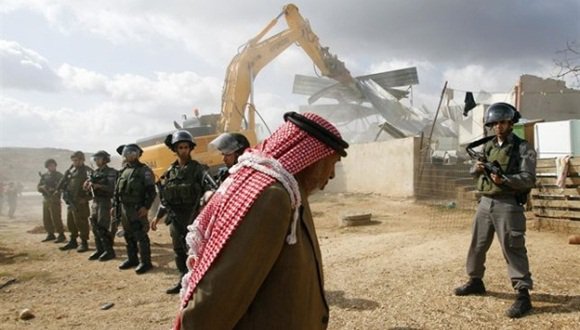Palestine
West Bank demolitions intensify, leaving hundreds homeless
Israeli bulldozers have toppled 323 homes and other buildings in the West Bank since the beginning of this year. Late last month, they destroyed a Palestinian primary school.

The Israeli military bulldozers are starting to feel at home in the neighborhood of Khirbet Tana, on the outskirts of Nablus. “They came many times to demolish our homes,” says Abu Imad, one of the elders of this tiny rural outpost, home to about 250 Palestinians. “This time they didn’t even spare the school, though, and the nearest one is now 10 kilometers away.”
“They want us to leave,” he adds. Israelis “allege that our homes are illegal. We’re not going to move. Our life is here on our homeland, in our fields and with our sheep.”
In the last week, Israeli authorities demolished 41 homes in Khirbet Tana, leaving 36 people, including 11 children, homeless. This was the second school demolished since the Israelis tore one down in 2011. Khirbet Tana’s “crime” is to be situated within Area C, the 60 percent of the West Bank that is fully controlled by Israel. It is also relatively close to a military training camp, and the Israelis have designated the surrounding area as a “firing zone,” where Palestinians are formally prohibited.
There are 38 Palestinian communities in “firing zones,” which make up 18 percent of the West Bank. Here a Palestinian could never get a building permit. Even a half-meter wall would be inexorably reduced to dust by Israeli bulldozers.
The Israeli government insists that its laws must be respected and that unauthorized buildings will be dealt with. The warning only applies to Palestinians; the Jewish settlements built in the West Bank after the 1967 occupation continue to expand in violation of international law. In recent months, despite European aid projects in Area C to help Palestinians settlements, demolitions have reached their highest levels since 2009, according to the U.N. Office for the Coordination of Humanitarian Affairs in the occupied Palestinian territory, or OCHA.
Since the beginning of this year Israeli armed forces have demolished or damaged 323 homes and other buildings in the West Bank, leaving 440 Palestinians, many of them children, homeless. A third of the targeted buildings had been donated to homeless families. Palestinians living in the hills south of Hebron, in the southern West Bank, have been at risk for many years. This area is full of military training zones and numerous settlements.
Bedouin communities east of Jerusalem are also a target of demolitions, including Abu al Nawar, just one of the 46 at-risk Bedouin communities. On Feb. 21, military bulldozers demolished Abu al Nawar’s primary school, built with E.U. funds, because Israel deemed it “illegal.” The soldiers confiscated the desks and chairs.
Warnings from OCHA couldn’t stop it. The world — including the Arab world — forgets about Palestinians and their rights. Israeli policies in the occupied territories are barely mentioned, while in other Middle East countries massacres, bombings, attacks and fighting are recorded every day.
International silence falls not only on the demolitions of Palestinians’ homes but also on other occupation policies: The use of administrative detention, without a trial, has accelerated after the beginning of latest Intifada in Jerusalem. (At least 180 Palestinians and almost 30 Israelis have been killed.)
A case in point: Mohammad Abu Sakha, 23, a member of the Palestinian Circus School, was jailed Dec. 14 while driving to visit his parents in Jenin. After he was arrested by young Israeli soldiers at the Nablus road block he wasn’t heard from for days. The Red Cross then got word that Abu Sakha was being held at the Megiddo prison facility. Abu Sakha began studying at the Circus School in 2007, and in 2011 he became one of the artists — he’s an acrobat. He also trains children with learning disabilities. Amnesty International launched a campaign in support of Abu Sakha ahead of a March 21 hearing on his appeal before Israeli military court.
Of the 7,000 political prisoners currently detained in Israel, around 10 percent are in administrative detention and have not been tried. The journalist Mohammed al Qiq had subjected himself to a three-month hunger strike for his detention. He suspended the hunger strike a week ago after reaching to an agreement with Israeli authorities.
Originally published at http://ilmanifesto.info/israele-intensifica-le-demolizioni-di-case-palestinesi-illegali/ on 2016-03-06
